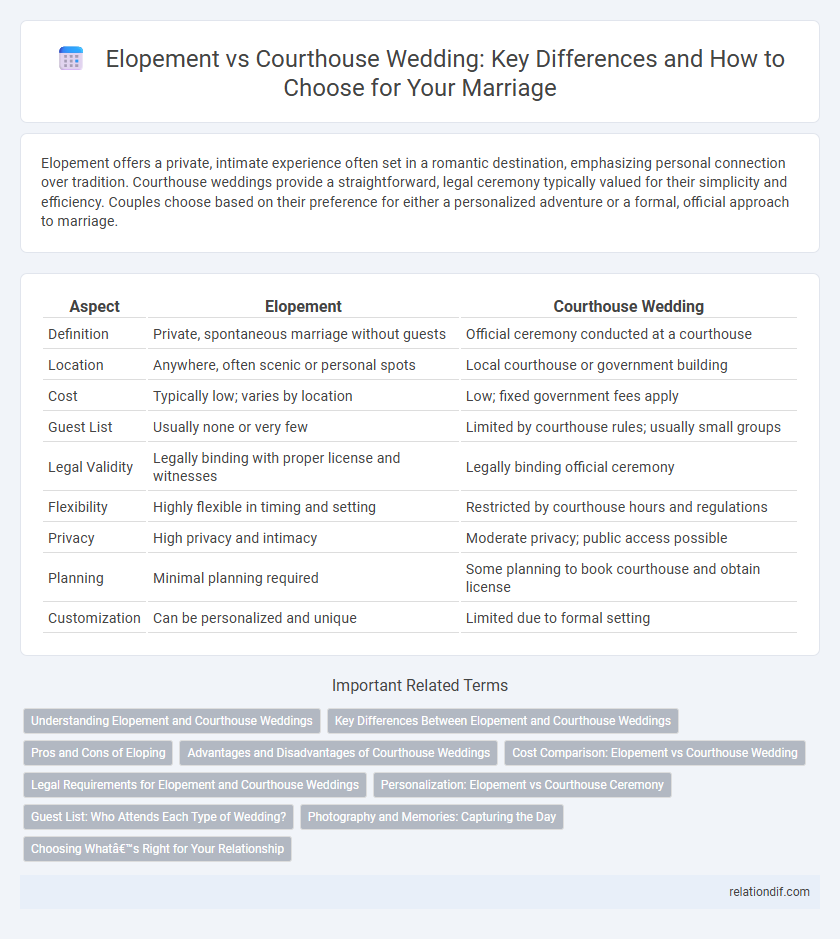Elopement offers a private, intimate experience often set in a romantic destination, emphasizing personal connection over tradition. Courthouse weddings provide a straightforward, legal ceremony typically valued for their simplicity and efficiency. Couples choose based on their preference for either a personalized adventure or a formal, official approach to marriage.
Table of Comparison
| Aspect | Elopement | Courthouse Wedding |
|---|---|---|
| Definition | Private, spontaneous marriage without guests | Official ceremony conducted at a courthouse |
| Location | Anywhere, often scenic or personal spots | Local courthouse or government building |
| Cost | Typically low; varies by location | Low; fixed government fees apply |
| Guest List | Usually none or very few | Limited by courthouse rules; usually small groups |
| Legal Validity | Legally binding with proper license and witnesses | Legally binding official ceremony |
| Flexibility | Highly flexible in timing and setting | Restricted by courthouse hours and regulations |
| Privacy | High privacy and intimacy | Moderate privacy; public access possible |
| Planning | Minimal planning required | Some planning to book courthouse and obtain license |
| Customization | Can be personalized and unique | Limited due to formal setting |
Understanding Elopement and Courthouse Weddings
Elopement typically involves a private, often spontaneous ceremony with few witnesses, emphasizing intimacy and simplicity over tradition. Courthouse weddings are official legal ceremonies held at a government building, offering a straightforward and cost-effective option for couples seeking a legally binding marriage without the complexities of a large event. Both options reflect modern shifts toward personalized and practical approaches to marriage ceremonies.
Key Differences Between Elopement and Courthouse Weddings
Elopement typically involves a private, spontaneous ceremony often held at a unique or sentimental location, whereas a courthouse wedding is a more formal, legal process conducted at a government office. Elopements emphasize intimacy and personalization with minimal guests, while courthouse weddings prioritize efficiency, simplicity, and legal documentation. The choice also impacts planning time and costs, with elopements potentially requiring more preparation for location and styling, compared to the straightforward courthouse procedure.
Pros and Cons of Eloping
Eloping offers couples intimacy and reduced costs compared to traditional ceremonies, eliminating guest lists and extensive planning. However, the lack of family involvement and potential legal complexities in some locations can pose challenges. This choice suits those prioritizing privacy and simplicity over formal celebrations and social traditions.
Advantages and Disadvantages of Courthouse Weddings
Courthouse weddings offer a streamlined, cost-effective alternative to traditional ceremonies, typically requiring less planning and reducing stress for couples. However, the lack of personalized elements and limited guest capacity may diminish the emotional experience for those seeking a more memorable celebration. Legal recognition is immediate and straightforward, but the setting often lacks the ambiance and symbolic significance found in other venues.
Cost Comparison: Elopement vs Courthouse Wedding
Elopement typically costs between $1,000 and $5,000, covering travel, attire, and minimal guest expenses, while courthouse weddings average around $100 to $500 for licenses and fees. Elopements often involve higher costs due to location choices and potential vendor fees, whereas courthouse weddings are financially simpler and more budget-friendly. Couples prioritizing cost savings usually prefer courthouse ceremonies, avoiding the added expenses linked to destination elopements.
Legal Requirements for Elopement and Courthouse Weddings
Legal requirements for elopement and courthouse weddings typically include a valid marriage license obtained from the relevant local government office, proof of identification such as a driver's license or passport, and meeting age requirements, usually 18 or older. Courthouse weddings often require a scheduled appointment with the clerk's office, while elopements may have more flexible locations but must still comply with state-specific regulations regarding witnesses and officiants. Both forms of marriage must adhere to residency or waiting period rules depending on the jurisdiction to ensure the marriage is legally recognized.
Personalization: Elopement vs Courthouse Ceremony
Elopements offer greater personalization by allowing couples to choose unique locations, intimate settings, and tailored experiences that reflect their personalities and relationship. Courthouse weddings are typically more standardized, with limited options for decorations, attire, and ceremony structure, focusing on efficiency and legal formalities. Couples seeking a meaningful, customized celebration often prefer elopements over traditional courthouse ceremonies.
Guest List: Who Attends Each Type of Wedding?
Elopements typically involve just the couple and an officiant, often excluding a guest list to maintain intimacy and spontaneity. Courthouse weddings may also be small but usually allow for a limited number of close family members or friends to attend, depending on venue regulations. The guest list size directly impacts the wedding atmosphere, with elopements fostering privacy and courthouse ceremonies providing minimal social support.
Photography and Memories: Capturing the Day
Elopement and courthouse weddings offer unique opportunities for photography, with elopements often providing scenic, intimate backdrops that create personalized, artistic memories. Courthouse weddings focus on candid, emotional moments within a formal setting, preserving the raw essence of the ceremony. Both options allow couples to capture timeless images that encapsulate the significance and joy of their special day.
Choosing What’s Right for Your Relationship
Elopement offers intimacy and spontaneity, ideal for couples seeking a private, stress-free experience without the pressures of a big event. Courthouse weddings provide legal simplicity and cost-efficiency, perfect for those prioritizing convenience and official documentation. Evaluating personal values, budget, and desired emotional ambiance helps partners decide the best approach tailored to their unique relationship needs.
elopement vs courthouse wedding Infographic

 relationdif.com
relationdif.com